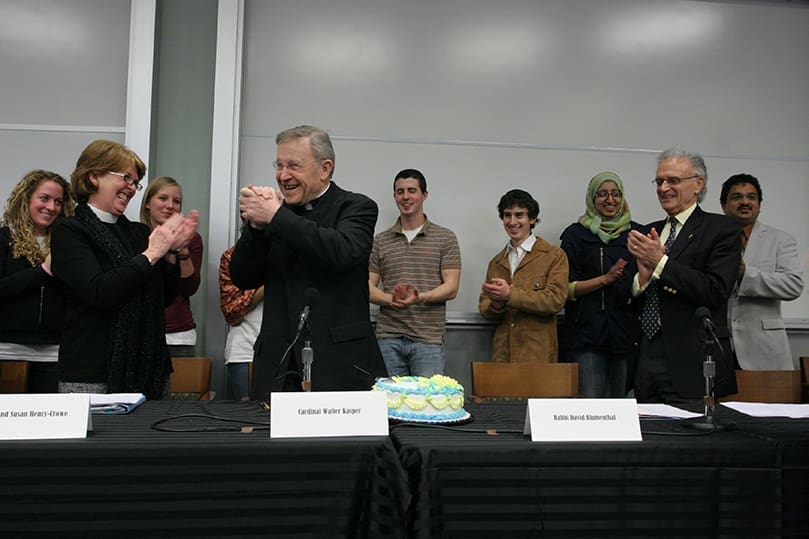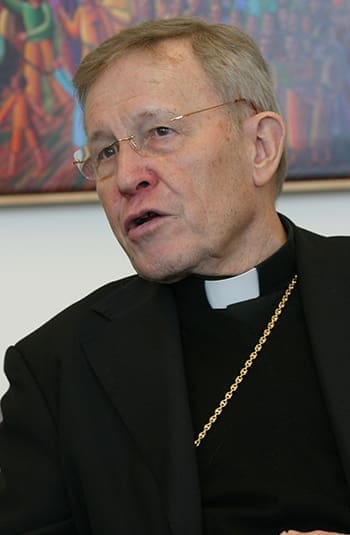 Photo By Michael Alexander
Photo By Michael AlexanderAtlanta
Ecumenist Sees New Moment To Proclaim God Of Love
By ANDREW NELSON, Staff Writer | Published March 18, 2010
A sell-out crowd came to listen when Cardinal Walter Kasper spoke at Emory University’s Glenn Memorial Chapel.
On Tuesday, March 2, the German cardinal spoke for more than an hour at the lecture titled “The Timeliness of Speaking of God” and took audience questions.
When the church “speaks in a new and fresh way of the living God who is love,” he said, “then it will render a service to life, freedom, justice, solidarity and love, then it can serve the dignity of humanity and the truth of reality.”
Cardinal Kasper is the president of the Pontifical Council for Promoting Christian Unity, which is involved in theological dialogues with the major Christian denominations and religious relations with Jewish groups.
His lecture in front of more than 1,200 people was part of a week’s visit to the university. He was introduced by Jan Love, dean and professor of Christianity, Candler School of Theology; Phillip Thompson, director, Aquinas Center of Theology; Archbishop Wilton D. Gregory; and James Wagner, president, Emory University.
There is a “pluralist Babel of voices” around the world focused on the God question, he said. While there is a new type of atheism, with a missionary zeal, at the same there are many seekers, with openness to the religious message, said the cardinal.
Catholic leaders have an opportunity to attract these seekers with compelling proclamation, he said. Indeed, he said, the church is true to its identity by not “anxiously closing her doors and windows” to conversations with others, “but on the contrary by opening them and entering into dialogue with other faiths,” he said.
The church reaches people with an “open identity combined with solidarity,” he said. “This means that neither personal nor national distinction, neither ethnic affiliation nor even academic greatness, nor force, money, power and influence, nor the self-assertion ‘of the fittest’ will be what counts in the end, but instead tolerance, respect, solidarity, forgiveness, goodness and tangible love will be what remains as the definitive reality.”
Answers Questions
Love, the dean of Emory’s theology school, read the audience questions during the 15-minute exchange with Cardinal Kasper.
Love asked about the history of Christian persecution of the Jewish people and about his personal journey to his role as the leader of the Catholic outreach to Jews.

Cardinal Walter Kasper meets with members of the media for one hour at Emory University’s Candler School of Theology during his recent Atlanta visit. Photo By Michael Alexander
The cardinal said he was at first hesitant about taking the position because of “all the baggage of German” history. But, he said, “My Jewish friends never let me feel anything of it. It was possible to build up an atmosphere of trust and sometimes of friendship.”
Pope Benedict XVI reaffirmed the Vatican Council II document Nostra Aetate, which set a new direction for relations between the church and other Christians and other faiths, he said.
The faith leaders may not always agree, but they respect each other, he said.
“There can’t be a hostility; a difference, of course, but not a hostility. We recognize each other in our otherness,” he said.
Faith leaders have said the discussions must not stay focused on the past, but look ahead to focus on contemporary issues facing the world, such as hunger, peace, environmental challenges, he said.
On the key issues “battling human freedom,” the cardinal said the Western world faces three challenges: a respect for human life, from conception to natural death; solidarity with the poor, who make up the majority in the world; and environmental problems.
“It is not so much an issue for our generation, but for future generations,” he said, adding the environmental concerns have to be dealt with by the wealthy countries since they consume a greater share of the world’s resources.
On the issue of the treatment of women in the church and culture, the cardinal said it had been a “learning process” for the church. He said it is clear the church upholds an “equality of dignity” between women and men. As a bishop for 10 years, he said he organized a commission on women to come up with suggestions on promoting the role of women in the church, outside of ordination.
“There is still a lot to do, not only in the theoretical position, but also in the practical consequences,” he said.
On the issue of admitting Anglicans dissatisfied with their faith community as Catholics, the cardinal said the pope, who established guidelines in November 2009 for groups of Anglicans seeking entry into the Catholic Church, was responding to a request by some Anglican bishops. He said the process outlined is not ecumenism, which he called the official dialogue between churches. That dialogue continues, he said.
“But if Anglicans do not feel happy and by reasons of conscience join our church, of course, they are welcomed. No church can be pleased by this, that is clear, but we recognize religious freedom.”